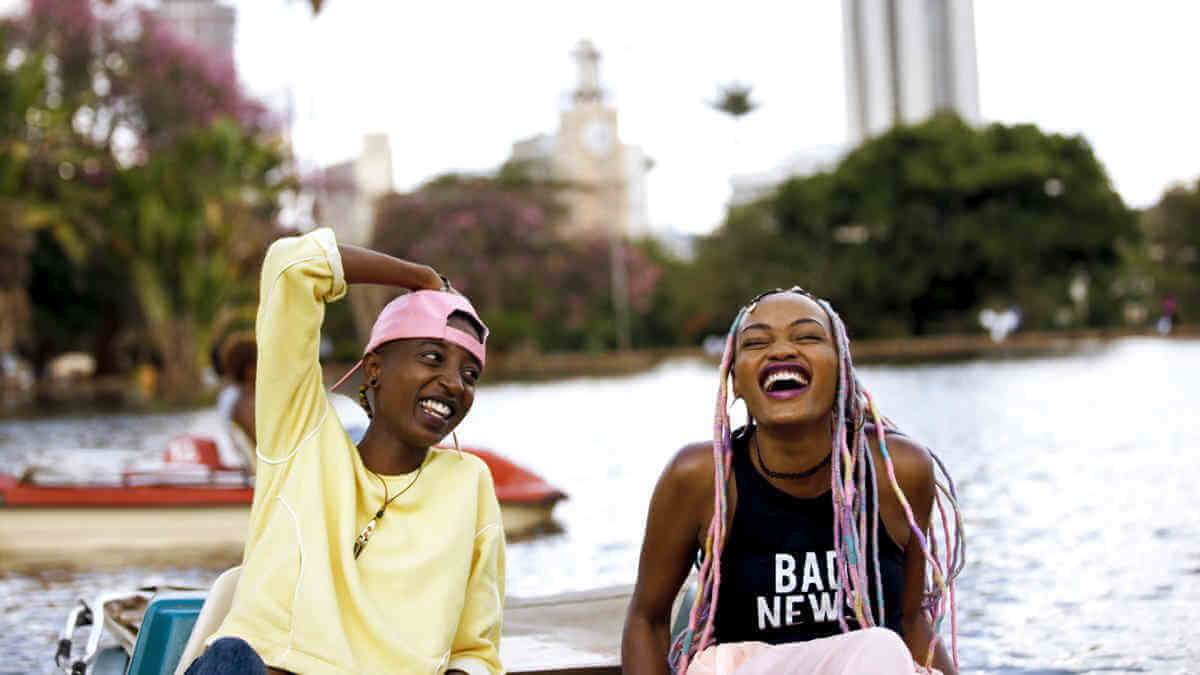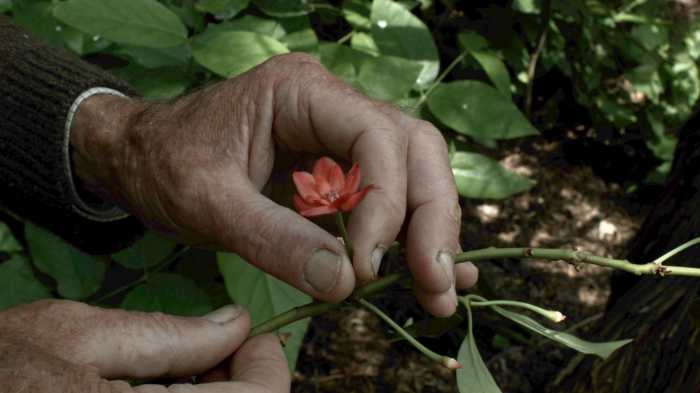The marvelous queer romance “Rafiki,” (“Friend”) — the first Kenyan film to screen at Cannes — was banned last year in its native country. Though the Kenya Film Classification Board objected to the film for “promoting lesbianism,” the ban was eventually lifted and “Rafiki” screened to crowds in Nairobi. The film’s temporary censoring, however, made it ineligible to be submitted as Kenya’s foreign film entry for the Academy Awards.
Now, New York audiences can see this touching drama, directed and co-written by Wanuri Kahiu. The filmmaker adapted the award-winning short story “Jambula Tree,” by Ugandan writer Monica Arac de Nyeko. “Rafiki” depicts the relationship that develops between the tomboy Kena (Samantha Mugatsia) and the sexy Ziki (Sheila Munyiva), two young women whose fathers are political rivals. As Kena and Ziki start to fall in love, they make a pact not to be “like everyone else;” they want to be “something real.” They talk and kiss and cuddle, though they also have a spat in response to a church sermon on same-sex marriage. Eventually, their relationship is discovered by others.
“Rafiki” is significant not just for showing how Kena and Ziki’s love blossoms, but for addressing homophobia, which is evident not only in slurs some of Kena’s friends employ toward a local gay man but also in acts of violence perpetrated against queer characters.
Via WhatsApp, Kahiu spoke with Gay City News about her controversial film.
GARY M. KRAMER: Your film was banned for “promoting lesbianism.” Can you explain the origin and controversy of “Rafiki”?
WANURI KAHIU: I wanted to tell a love story, and the short story, “Jambula Tree,” was not banned. I wanted to honor that piece. I was reacting to my world as an artist. I wanted to tell a love story based in Kenya. We have no stories that had characters that looked like me. The fact that it was two women in love was just two women in love. Love is love, and I want to be clear about that while creating the film — that love happens to anyone it meets on its path.
As far as “promoting homosexuality,” I wanted to depict a story that is hopeful but also contains harsh realities in a country where same-sex love is illegal. I wanted to normalize the idea that love can happen to anyone at any time, and I wanted to be clear that there is no otherness in love. In that way, I wanted to make sure it felt like any other love story. If it promoted or normalized homosexuality, then more power to it.
Promoting [in the censors’ eyes] means trying to turn people gay. That’s an absurdity to me. The film helped people come out; many people came out after seeing “Rafiki.” Or it hopefully helped people feel less alone or see that how they love is fine as a result of watching “Rafiki.” I wish I had the power to change people’s sexuality. That would be an awesome superpower! As a filmmaker, I don’t think I have the control the government seems to think I have.
KRAMER: Given the attitudes about homosexuality in Kenya, were you expecting the ban and generating controversy when you set out to make this film?
KAHIU: We knew it could be potentially dangerous. We were on the side of the law. We didn’t break any laws. We submitted the script to get a license. Our constitution has a freedom of expression clause and the clause has categories of what can’t be made, so we were confident we could create the film. We carefully, thoughtfully, and deliberately made the film, so it was protected — as was anyone associated with the film.
KRAMER: “Rafiki” had a successful release when it was finally shown theatrically. What can you say about the experience of taking the case to court to get your film exhibited in your native country?
KAHIU: I think the Classification Board had a lot to do with that. The [decision-maker] said during the meeting to give it a rating, “If I ban this film, it will make you very popular.” He knew the result of what a ban would do. He expected us to roll over. It was amazing that people went out — and went more than once — to watch “Rafiki.” It was amazing for what it did for the LGBT community here. The response from them was so beautiful. We were gracious and honored, after all the work we had done.
KRAMER: What decisions did you make in how you portrayed the relationship between Kena and Ziki physically?
KAHIU: We wanted to create a tension to capture that moment of falling in love. You see the lingering first glances and the growth of it. Falling in love is anxious, scary, and intimidating, and awkward, and thrilling all at the same time! So, it was about how to create that anxiousness.
KRAMER: The film depicts scenes of homophobia — both verbal abuse and physical violence. Can you talk about incorporating that content and depicting it?
KAHIU: The film’s gay male character needed to be someone Kena can see and recognize in the same community and foreshadow what could happen to the girls. But he also is a symbol of silence, strength, and support. One in five people in the LGBT community are assaulted in Kenya. While it is important that we see them fall in love, it was also important to talk about the violence against our community from every side. Who feels they have the authority over women’s bodies? And if we don’t address that, then we won’t have an understanding of the long and continued patriarchal relationship that women have in countries where women live under a patriarchy.
KRAMER: What can you say the impact of making “Rafiki” has been?
KAHIU: No one has the right to intimate anyone for freedom of expression. That’s in the constitution, as well. It is a beautiful clause I hold so dearly. That’s why we were in court. We live in a world that doesn’t reflect the values we want reflected. If we sit back in silence, there is nothing we are doing to hinder the progress of evil. In my way, I’m fighting for freedom of expression. I do not have the luxury of being silent when acts of despicable patriarchy and inequality happen around me.
Making films is important — we remember the love and softness and emotion — and it tests relationships and prompts conversations about the rights of LGBT community, rights of privacy, and freedom of expression. Those conversations would not have happened if I had not made this film.
RAFIKI | Directed by Wanuri Kahiu | In English and Swahili with English subtitles | Film Movement | Opens Apr. 19 | Quad Cinema, 34 W. 13th St.; quadcinema.com | Stuart Cinema & Café, 79 West St., btwn. Greenpoint Ave. & Milton St., Greenpoint; stuartcinema.com



































